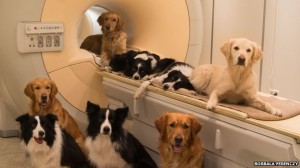Devoted dog owners often claim that their pets understand them. A new study suggests they could be right.By placing dogs in an MRI scanner, researchers from Hungary found that the canine brain reacts to voices in the same way that the human brain does.Emotionally charged sounds, such as crying or laughter, also prompted similar responses, perhaps explaining why dogs are attuned to human emotions.
Eleven pet dogs took part in the study; training them took some time. “We used positive reinforcement strategies – lots of praise,” said Dr Andics.
“There were 12 sessions of preparatory training, then seven sessions in the scanner room, then these dogs were able to lie motionless for as long as eight minutes. Once they were trained, they were so happy, I wouldn’t have believed it if I didn’t see it.”

Pet dogs took part in the MRI scanning study.
Image source: BBC News website.
The canine brain reacted to voices in the same way that the human brain does. For comparison, the team looked at the brains of 22 human volunteers in the same MRI scanners. The scientists played the people and pooches 200 different sounds, ranging from environmental noises, such as car sounds and whistles, to human sounds (but not words) and dog vocalisations.
“Dogs are a very interesting animal to look at – we have selected for a lot of traits in dogs that have made them very amenable to humans. Some studies have show they understand a lot of words and they understand intentionality – pointing.”
But she added: “It would be interesting to see the animal’s response to words rather than just sounds. When we cry and laugh, they are much more like animal calls and this might be causing this response.
“A step further would be if they had gone in and shown sensitivity to words in the language their owners speech.”
Dr Andics said this would be the focus of his next set of experiments.
To read the full article, go to the BBC News website.





